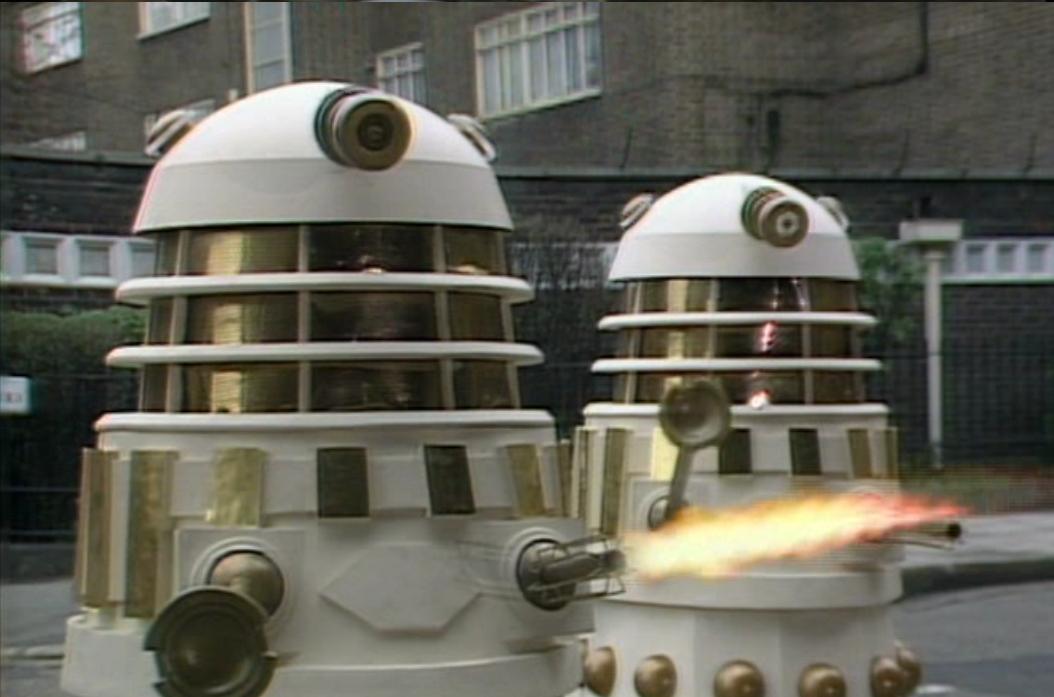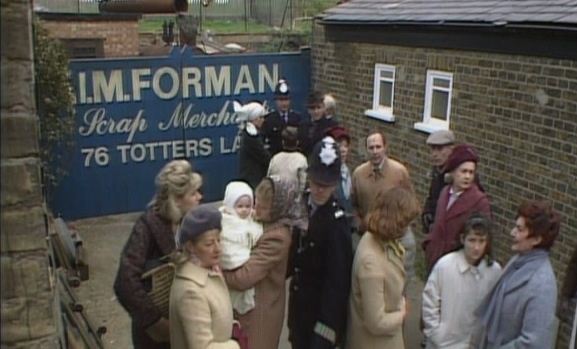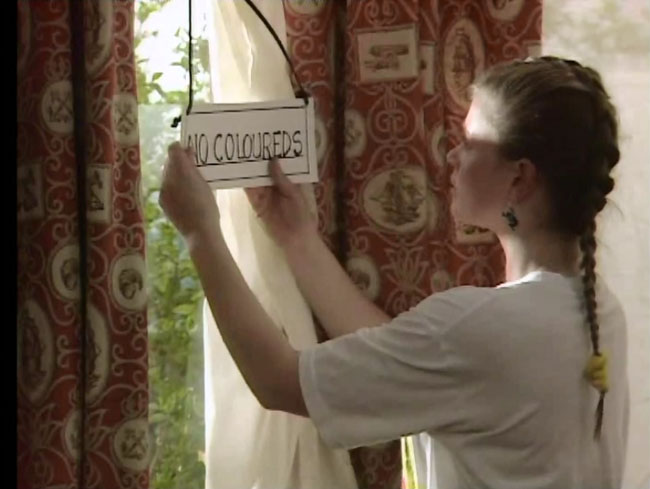‘Remembrance of the Daleks’ is considered by many to be a classic Doctor Who story. What is it about this Seventh Doctor adventure that makes it so popular?

By 1988, Doctor Who had been through a bumpy few years. By the skin of its teeth, it had survived cancellation in 1985, but its relaunch in 1986 had struggled to find an audience. Moreover, the hurried re-casting of the famous Time Lord had divided fandom, and many people were unsure about the direction the programme was heading in.
‘Remembrance of the Daleks,’ however, arrived at just the right time. Doctor Who now had a new script editor in the form of Andrew Cartmel, who was determined to inject a new sense of mystery into the programme – an agenda that later became known as The Cartmel Master Plan within fandom. At the same time, 1988 marked Doctor Who‘s 25th anniversary, and the producer John Nathan-Turner wanted to do something special to mark the occasion.
These lines of thought culminated in a four part adventure by new Doctor Who writer Ben Aaronovitch, who is now better-known for his popular Rivers of London book series. With ‘Remembrance of the Daleks,’ Aaronovitch delivered a story that was firmly rooted in Doctor Who‘s mythology, whilst also seeding a new sense of mystery that could drive the show forward.
Of course, not everyone was going to spot (or understand the significance of) the many continuity references that appeared in ‘Remembrance of the Daleks,’ but for the confirmed Doctor Who fan, there were some exciting inclusions. For a start, the opening episode took place in a junk yard on Totter’s Lane – the very one that featured in Doctor Who‘s first episode ‘An Unearthly Child.’ Similarly, the Coal Hill School made a return appearance, and this was significant as it was the school that the Doctor’s granddaughter Susan attended, as well being the place where his first companions Ian and Barbara worked.

At the same time, ‘Remembrance of the Daleks’ expanded upon the story of ‘An Unearthly Child.’ In Aaronovitch’s scripts, it transpired that the Doctor had left something behind during his previous visit – a relic from his home planet known as the Hand of Omega, which the Daleks intended to steal.
Moreover, Cartmel and Aaronovitch started dropping hints about the Doctor’s origins throughout the story. In one scene, the Doctor tells his companion Ace that “we” had problems with the Hand of Omega’s prototype, implying that he was working alongside Rassilon and Omega during the formation of Gallifreyan society. He quickly corrects himself, although his expression implies that he’s not being entirely truthful.
There was also a scene in the final part of ‘Remembrance of the Daleks’ in which the Doctor tells Davros (the Daleks’ creator) that he is “far more than just another Time Lord,” although the canonicity of this scene is debatable as it was cut from the transmitted version.
One moment that did remain, however, was the scene in which the Seventh Doctor convinced a Dalek to destroy itself. This, apparently, came about at Sylvester McCoy’s request, who insisted that his Doctor would not simply blow the creature up, as the script had originally attested. Thus, in the transmitted version, the Doctor confronts the Dalek in a back-street and convinces it that there is no point in carrying on living, and the Dalek essentially kills itself.
Although controversial, this scene from ‘Remembrance of the Daleks’ is often cited as a classic example of the Seventh Doctor’s manipulative behaviour – a facet of his character that would be explored in the subsequent season, and in the Virgin Books series that followed. Moreover, this scene would be discretely referenced in the 2005 episode ‘Dalek,’ and in 2010’s ‘The End of Time – Part Two,’ cementing its importance in Doctor Who canon.
And whilst these mysterious moments certainly added to the excitement surrounding ‘Remembrance of the Daleks,’ the serial was also noted as being one of the first to tackle the issue of racism head-on. ‘Remembrance of the Daleks’ did not paint 1963 in a stylised, romantic light; rather, it was shown to be a gritty, uncertain world where divisions were prevalent.
For instance, there was a scene in episode two where the Doctor conversed with a black man in a cafe about the consequences of the slavery to which his family had been subjected. And in another striking moment, Ace discovered a ‘no coloureds’ sign in the window of the house that she was staying in.

And these weren’t isolated moments. Racism is actually the dominant theme in ‘Remembrance of the Daleks.’ Apparently, Ben Aaronovitch wanted to unpack this issue after he recalled that the Daleks were originally inspired by the Nazis. And whilst earlier versions of his scripts included references to the Thals (one of the races from the planet Skaro that the Daleks had tried to destroy) he eventually settled on the racial divisions that existed within the Dalek race itself. Aaronovitch highlighted the monsters’ obsession with racial purity by having the black and white Daleks go head-to-head in a battle to the death.
Of course, the success of ‘Remembrance of the Daleks’ wasn’t down to its moral messages or continuity references. It was a blend of many things, but it (probably) succeeded because it told a gripping, fast-paced and enjoyable story which fans loved.
Writing in The Guardian in 2013, one critic summed it up perfectly: “‘Remembrance of the Daleks’ was when Doctor Who started to get its groove back,” they said. “In the 25th anniversary year, an old enemy was given a reboot, a hat was tipped to the show’s history and a spunky new companion got to batter a Dalek with a baseball bat. The story had a sharp political subtext, the brazen racism of 1960s London a counterpoint the Daleks’ fascistic tendencies [sic]… It deserves its iconic status.”
What’s your favourite moment from ‘Remembrance of the Daleks’? And do you think it deserves to be recognised as one of the Seventh Doctor‘s greatest adventures? Let me know in the comments below.

Seventh Doctor jumper – order now from the Lovarzi shop!


Oh yes, most definitely it deserves to be recognised as a great story, not just in McCoy’s catalogue but of all time! Quite frankly, it’s up there with Genesis of the Daleks.
From the opening of that space craft approaching Earth I knew it was going to be a little different from previous stories. In no time at all we see the Doctor become fascinated by an aerial on the roof of a van, introduce himself to a scientist and tackle a Dalek. Becoming involved with the unknown comes naturally to him, especially when others accept his advice so readily – they might have doubts at first but the Doctor seems to know what he is talking about.
And throughout Remembrance there are many surprises. The tackling of racism was perfect. Even as a teenager I felt quite appalled at that landlady for even having a sign like that in her window.
Jasmine Breaks was fantastic as the girl (later named Judith Winters in a short comic). That scene at the end between her and Ace broke my heart.
I’ll always have a fondness for this story. It was beautifully written and directed, the score so delicious.
I felt the same way when I saw that opening! It was so wonderfully cinematic.
This is my fave episode. Why? The Doctor is proactive for a change. An aspect I love about the Seventh Doctor.. He has schemes and plans,, An active protagonist instead of reacting to everything. Something even the 11t.th doctor reflects and flares up in the 13th. This is why the 7th Doctor is tied with the 12th. Though I am really beginning to warm up to the 2nd as the animated lost episodes are coming out. Also the Daleks were a viable menace again and this goes to my favorite scene.- The Doctor thinks he’s safe on the stairs and the Dalek start to levitate.
Of course, I’d forgotten about the stairs scene! A defining moment in the history of Who.
I loved how Remembrance continued on with the Dalek civil war which started in Resurrection. Love the idea of two Dalek factions. I did notice at the very end when the Dalek mothership explodes, you see Davros escaping in his escape pod. You won’t see him again until the Tennant years..
Yes,definitely deserves its reputation as one of the best. The treatment of racism is handled well and not too heavily handed, we see the beginnings of Chunky Gilmore’s Counter Measures Group, there is a brilliant reference to Bernard Quatermass( Doctor Who’s debt to Nigel Kneale needed this acknowlegdement) and Sylvester shone.
I do admit that it is a biased opinion from, me as I saw it on original transmission in 1988, but I still think it’s the best episode of Doctor Who ever made, classic series or new.